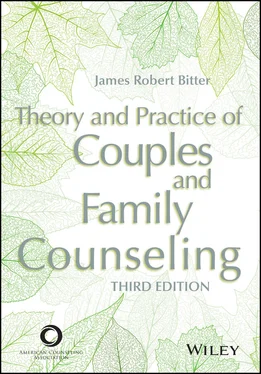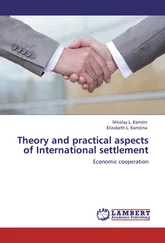James Robert Bitter - Theory and Practice of Couples and Family Counseling
Здесь есть возможность читать онлайн «James Robert Bitter - Theory and Practice of Couples and Family Counseling» — ознакомительный отрывок электронной книги совершенно бесплатно, а после прочтения отрывка купить полную версию. В некоторых случаях можно слушать аудио, скачать через торрент в формате fb2 и присутствует краткое содержание. Жанр: unrecognised, на английском языке. Описание произведения, (предисловие) а так же отзывы посетителей доступны на портале библиотеки ЛибКат.
- Название:Theory and Practice of Couples and Family Counseling
- Автор:
- Жанр:
- Год:неизвестен
- ISBN:нет данных
- Рейтинг книги:5 / 5. Голосов: 1
-
Избранное:Добавить в избранное
- Отзывы:
-
Ваша оценка:
- 100
- 1
- 2
- 3
- 4
- 5
Theory and Practice of Couples and Family Counseling: краткое содержание, описание и аннотация
Предлагаем к чтению аннотацию, описание, краткое содержание или предисловие (зависит от того, что написал сам автор книги «Theory and Practice of Couples and Family Counseling»). Если вы не нашли необходимую информацию о книге — напишите в комментариях, мы постараемся отыскать её.
Theory and Practice of Couples and Family Counseling — читать онлайн ознакомительный отрывок
Ниже представлен текст книги, разбитый по страницам. Система сохранения места последней прочитанной страницы, позволяет с удобством читать онлайн бесплатно книгу «Theory and Practice of Couples and Family Counseling», без необходимости каждый раз заново искать на чём Вы остановились. Поставьте закладку, и сможете в любой момент перейти на страницу, на которой закончили чтение.
Интервал:
Закладка:
ACA (2014) echoes this position, calling on counselors to
clearly define who is considered “the client” and discuss expectations and limitations of confidentiality. Counselors seek agreement and document in writing such agreement among all involved parties regarding the confidentiality of information. In the absence of an agreement to the contrary, the couple or family is considered to be the client. (Standard B.4.b.)
Even if you are successful in negotiating a contract that identifies the client as the whole family, issues of confidentiality persist. The limits on confidentiality with a whole family are the same as those that exist in group counseling or therapy: The practitioner cannot guarantee that members of the family will not disclose essentially private information to others outside of the session. This potential dynamic also weakens, if not removes, the legal benefit of privileged communication (Remley & Herlihy, 2020). In short, communication between a client and you as the counselor is valued legally, in that a court of law may find that the benefits of protecting privacy outweigh the public’s need to know the content of therapeutic conversations. However, once another person is present in the room, as in couples and family work, legal protection of privileged communication no longer exists. If they viewed their individual rights and protections from a legal perspective, clients might find that agreeing to family counseling might not be in their individual best interest.
Handling Relational Matters in an Individual Context
Given the propensity of both the law and professional codes to designate as the client each individual, a host of relational concerns must be clarified and addressed before counseling or therapy can begin. Among these issues are “extramarital affairs, commitment to the relationship, sexual activities/preferences/orientations, criminal activities, substance use, and mental states suggesting the risk of violence and dangerousness to self or others” (Woody & Woody, 2001, p. 31). Similar issues for children and adolescents must be considered, as must “behaviors that pose potential risk to the child’s health and welfare, e.g., truancy, substance use, gang affiliations, etc.” (p. 31).
If both your professional approach and your personal values are grounded in the idea that joining with family secrets does not promote the welfare of the family, what do you do with this predicament? IAMFC (2017) states, “Couple and family counselors do not participate in keeping secrets for or from clients” (p. 1).
All of the family practice codes support individual confidentiality, but only if it does not contribute to maintaining unhealthy family dynamics. There is not a great deal of direction in these guidelines for handling ethical dilemmas related to the common issues we have discussed. In holding to individual confidentiality within the context of family counseling or therapy, obvious concerns surface with the principle of beneficence and your obligation to promote client welfare.
Gender and Cultural Issues
Feminists long have noted that the normal family, across cultures, has not always been so good for women. A gender perspective in ethics reminds us that patriarchy has real effects on all genders and has to be taken into account when people are engaged in ethical decision-making. Feminists also remind us that patriarchy is just one form of oppression and that discrimination on the basis of race, gender, disability, religion, age, sexual orientation, cultural background, national origin, marital status, and political affiliation still has to be factored deliberately into ethical stances.
Because discrimination, oppression, and marginalization have been such a big part of the social contexts in which we live, a consideration of gender and cultural perspectives in ethical decision-making is essential. In spite of what may be codified in law, there are indeed multiple perspectives on the family that emanate from various cultures. Western cultures tend to portray the nuclear family as normal, limiting it to parents and their children. If the law and Western culture want to recognize aunts, uncles, cousins, grandparents, and ancestors as part of a family system, these family members are called extended family . Such languaging, just as much as physical separation, distances individuals from their natural support systems. In cultures in Africa, Asia, the Middle East, and South America, as well as in some Native American societies, many different members—and sometimes multiple wives—and multiple generations are included in the conceptualization of family. Such a conceptualization of family can often bridge the physical distance between individuals and create a very different ethical stance in the world.
Even in Western cultures today, the forms that constitute family vary widely from the nuclear model that has been enshrined as normal. Functional families are led by single mothers, single fathers, grandparents, single gay fathers, single lesbian mothers, gay coparents, lesbian coparents, and cohabitating parents who have never married. Any of these families may also include biological children, children in foster care, children from surrogate parents, or adopted children. In the United States, we are experiencing a cultural war in relation to the debate over what constitutes marriage and the family. It is a war that recognizes that the definitions of both have already changed. Because there is no evidence of inherent harm in any of these different couple and family arrangements, family practitioners have an affirmative moral and ethical responsibility to support and care for families in all of their diverse forms (Walsh, 2016a).
Think about your own family of origin. What perspectives on family, culture, and gender were contained in your upbringing? What virtues and limitations were contained in your family’s worldview? How many kinds of families and cultural perspectives have you encountered in your lifetime? What experiences, if any, did your family of origin have with discrimination or oppression based on cultural differences or because your family had a different structure than the heterosexual nuclear family that has been declared normal in the dominant culture?
Professional Regulations and Legal Requirements
Although we tend to associate professional regulations with the professional boards of each state, in fact many groups get involved in the process of safeguarding both the public and the profession. Among these groups are voluntary professional organizations, state regulatory agencies, federal regulatory agencies, the judicial system, third-party payers (i.e., insurance companies and managed care companies), national regulatory associations, and sometimes international regulatory entities. Again, each of these groups has a recursive influence on the others: We often find, for example, that there is very little difference between the legal requirements for the practice of couples and family counseling and the certification requirements of various professional organizations. Indeed, it is not uncommon for licensure requirements to include specific professional certifications as a first step toward licensure.
All of the professional regulation agencies attempt to address three questions related to family practice: What is family counseling or therapy? How is competence as a family practitioner assessed and measured? How valid and relevant are those competency measures for protecting consumers?
Stukie and Bergen (2001) suggested 10 principles that should be considered in the development of professional regulations in the field. Among their recommendations are a comprehensive model based on effective professional development and growth rather than minimal competence; fully funded, staffed, and empowered regulatory boards; integrated regulatory boards that address all aspects of psychotherapy rather than separate disciplines; ongoing competency assessments that are demonstrable in spite of the costs and logistical problems that may be involved; standards of practice that detail requirements related to advertising, record keeping, informed consent, and other legal expectations for practitioners; disciplinary procedures that are immediately responsive to the needs of clients and practitioners; and the right of consumers to choose the mental health providers of their choice.
Читать дальшеИнтервал:
Закладка:
Похожие книги на «Theory and Practice of Couples and Family Counseling»
Представляем Вашему вниманию похожие книги на «Theory and Practice of Couples and Family Counseling» списком для выбора. Мы отобрали схожую по названию и смыслу литературу в надежде предоставить читателям больше вариантов отыскать новые, интересные, ещё непрочитанные произведения.
Обсуждение, отзывы о книге «Theory and Practice of Couples and Family Counseling» и просто собственные мнения читателей. Оставьте ваши комментарии, напишите, что Вы думаете о произведении, его смысле или главных героях. Укажите что конкретно понравилось, а что нет, и почему Вы так считаете.












